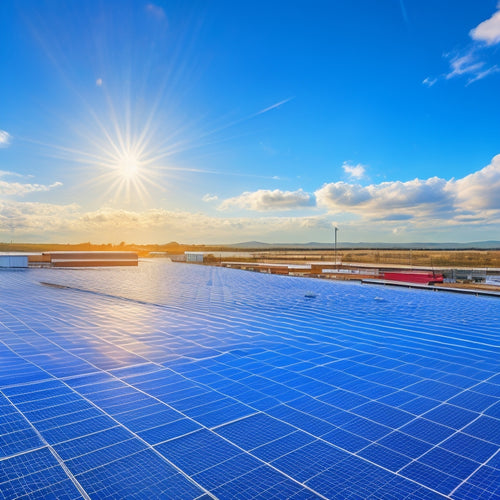
Solar Panel Battery Bank Price
Share
You're likely considering a solar panel battery bank to gain energy independence and reduce your reliance on the grid, and a critical factor in this decision is understanding the associated costs. The price of a solar panel battery bank varies depending on your daily energy needs, with systems sized to meet your specific requirements. Deep cycle battery types, such as lead-acid, lithium-ion, and nickel-cadmium, differ in chemistry, performance, and cost. By evaluating your power requirements and selecting the right battery type, you can guarantee a reliable and efficient energy storage system. Now, get ready to uncover the specifics that will help you make an informed decision.
The Essentials
- The cost of a solar panel battery bank depends on the type and quality of batteries, with lithium-ion options typically being more expensive than lead-acid.
- Deep cycle batteries vary in price, with a 48V 100Ah lithium-ion battery costing around $1,000, and a 12V 200Ah lead-acid battery costing around $200.
- The total cost of a solar panel battery bank includes the cost of the batteries, inverter, charge controller, and installation, ranging from $5,000 to $20,000 or more.
- A well-sized solar panel battery bank can provide significant energy savings, with some systems paying for themselves in as little as 5-7 years through reduced grid reliance.
- System sizing calculators can help determine the ideal battery bank size and cost based on daily energy consumption, solar panel array size, and inverter capacity.
Increased Energy Independence
By investing in a solar panel battery bank, you'll reduce your reliance on the grid and gain more control over your energy usage.
This means you'll be less affected by power outages and rate hikes, ensuring energy security for your home.
With a battery bank, you'll have the autonomy to use your stored energy whenever you need it, reducing your dependence on external power sources.
Reduced Reliance on Grid
Your energy independence grows with every kilowatt-hour your solar panel system generates, reducing your reliance on the grid. As you produce more of your own clean energy, you'll be less dependent on traditional grid alternatives, enjoying greater freedom from utility companies. This means you'll experience significant energy savings, which can add up quickly.
| Grid Reliance | Energy Savings | Freedom Level |
|---|---|---|
| 100% | $0 | Low |
| 75% | $500/year | Medium |
| 50% | $1,000/year | High |
| 25% | $2,000/year | Very High |
| 0% | $5,000/year | Ultimate |
Energy Security for Homes
Energy security for homes is a critical aspect of solar panel battery bank systems, as it directly correlates with increased energy independence.
With a solar panel battery bank system, you can guarantee a stable and reliable source of energy, reducing your reliance on the grid. This means you'll be less affected by power outages, rate hikes, and other external factors that can disrupt your daily life.
By leveraging advanced home power backup systems Renewable Energy Storage, you can maximize your energy savings and enjoy a seamless backup power supply, even during outages.
Advanced energy management systems integrated with your solar panel battery bank allow you to monitor and control your energy usage in real-time. This enables you to optimize your energy consumption, reducing waste and saving you money.
Home automation features can also be integrated, allowing you to automate energy-intensive tasks, such as charging your electric vehicle or running appliances, during off-peak hours when energy rates are lower.
Reduced Carbon Footprint Guaranteed
You're switching to eco-friendly energy solutions with your solar panel battery bank, ensuring a reduced carbon footprint guaranteed.
By utilizing renewable power from the sun, you're greatly decreasing your reliance on fossil fuels and mitigating your impact on the environment.
With the cost of solar panels decreasing and renewable energy pricing becoming more competitive, it's never been a better time to make the switch.
This clean energy alternative not only benefits the planet but also contributes to a healthier, more sustainable future.
Eco-Friendly Energy Solutions
With the growing concern about climate change, adopting eco-friendly energy solutions has become a priority for many individuals and organizations. You're likely considering solar energy innovations as a way to reduce your carbon footprint and contribute to a sustainable future. By investing in eco-friendly energy solutions, you'll not only minimize your environmental impact but also save money on energy bills in the long run.
Here's a breakdown of the benefits of eco-friendly energy solutions:
| Solution | Benefits |
|---|---|
| Solar Energy | Renewable, Zero Emissions, Low Maintenance |
| Energy Storage Systems | Increased Energy Independence, Reduced Grid Reliance |
| Energy Efficiency Upgrades | Reduced Energy Consumption, Cost Savings |
| Wind Energy | Renewable, Low Operating Costs, Carbon Reduction |
| Geothermal Energy | Renewable, Reliable, Low Visual Impact |
Renewable Power Source
Renewable Power Source (Reduced Carbon Footprint Guaranteed)
Nearly 75% of the world's electricity generation comes from burning fossil fuels, contributing greatly to greenhouse gas emissions and climate change. You have the power to change this by switching to a renewable power source.
Solar energy is a clean and reliable alternative that can markedly reduce your carbon footprint. With the integration of Residential Solar Systems, you can capture the sun's energy and convert it into electricity, ensuring a seamless and efficient experience.
Additionally, a high-quality house solar battery solves problems such as high electricity bills and unexpected power outages.
But what about when the sun isn't shining? That's where power storage comes in. A battery bank stores excess energy generated during the day, allowing you to tap into it at night or during power outages.
Deep Cycle Battery Types
You'll need to contemplate two key aspects when selecting a deep cycle battery: battery chemistry options and cycle life expectancy.
With a focus on maximizing renewable energy storage and reducing reliance on the grid, it's crucial to choose a battery that meets your specific home energy needs high-performance batteries.
You can choose from lead-acid, lithium-ion, or nickel-cadmium batteries, each with its own strengths and weaknesses.
As you evaluate these options, you'll also want to understand the expected lifespan of each type, typically measured in charge/discharge cycles.
Battery Chemistry Options
How do deep cycle batteries differ in terms of chemistry, and what're the implications for your solar panel battery bank? You're about to find out.
Deep cycle batteries come in various chemistries, each with its strengths and weaknesses. Lead acid batteries, the traditional choice, have drawbacks such as low depth of discharge (DOD), limited cycle life, and heavy weight.
They're also prone to sulfation, which reduces their overall performance. On the other hand, lithium-ion batteries offer several advantages, including higher DOD, longer cycle life, and lighter weight.
They're also more efficient and require less maintenance. Lithium batteries can charge faster and have a lower self-discharge rate, making them ideal for solar panel systems.
However, they're generally more expensive than lead acid batteries. As you consider your solar panel battery bank, it's crucial to weigh the pros and cons of each chemistry type to determine which one best fits your needs and budget.
Cycle Life Expectancy
When it comes to evaluating deep cycle battery types for your solar panel battery bank, cycle life expectancy is an essential factor to take into account. You want to guarantee the batteries will last for a long time and provide reliable power.
Cycle life expectancy refers to the number of charging cycles a battery can handle before its capacity drops to 80% of its original value. A deeper cycle life expectancy means you'll need to replace your batteries less often, which saves you money in the long run.
Look for batteries with a high cycle life expectancy, typically above 2,500 cycles. Proper battery maintenance is vital to achieving this lifespan. Regularly check the battery's state of charge, voltage, and temperature to prevent overcharging or undercharging, which can reduce the cycle life.
Some deep cycle battery types, like lithium-ion, are designed to handle more charging cycles than others, like lead-acid. With proper care, lithium-ion batteries can last up to 5,000 cycles or more.
Consider your specific energy needs and choose a battery type that meets those requirements. By selecting a battery with a high cycle life expectancy, you'll enjoy a more reliable and cost-effective solar panel battery bank.
Check Your Power Requirements
You need to determine your daily energy needs to accurately size your solar panel battery bank. To do this, calculate your total daily energy consumption in watt-hours (Wh) by adding up the power requirements of all your appliances and devices.
Considering a reliable backup power solution is essential, especially with the increasing frequency of blackouts renewable energy solutions. You can use a system sizing calculator to simplify this process and guarantee you're specifying the right battery bank for your needs.
Daily Energy Needs
Your home's daily energy needs dictate the capacity of the solar panel battery bank you require. To determine your energy consumption, you need to assess your usage patterns and identify the appliances that consume the most power. This includes your lights, refrigerator, air conditioner, and other vital devices.
Calculate the total wattage of each appliance and multiply it by the number of hours you use it daily. Add up the total energy consumption in watt-hours (Wh) to get your daily energy needs.
For instance, if you have a 100W refrigerator that runs for 8 hours a day, it consumes 800Wh of energy. Similarly, calculate the energy consumption of other appliances and add them up. This will give you your total daily energy needs.
A higher energy consumption means you'll need a larger solar panel battery bank to meet your power requirements. Accurately determining your daily energy needs is essential to selecting the right solar panel battery bank size and ensuring you have a reliable and efficient energy storage system.
System Sizing Calculator
A system sizing calculator is an essential tool for determining the ideal solar panel battery bank size based on your specific power requirements.
This calculator takes into account your daily energy needs, which you've already calculated, and provides a customized solution for your solar panel system. By inputting your energy requirements, the calculator will recommend the best battery bank size, solar panel array size, and inverter capacity to guarantee efficient energy production and storage.
The system sizing calculator also considers system efficiency, installation costs, and other factors that impact your solar panel system's performance.
This guarantees that your system is designed to maximize energy production while minimizing costs. With a well-sized system, you'll enjoy greater energy independence and reduced reliance on the grid.
Longer Cycle Life Guaranteed
When you invest in a solar panel battery bank, you expect it to last for a long time.
A longer cycle life guarantee guarantees your battery's extended durability, providing you with a reliable source of power over its lifespan.
With a higher number of charge and discharge cycles, your battery bank will perform consistently, reducing the need for frequent replacements and saving you money in the long run.
Extended Battery Durability
How does a solar panel battery bank manage to provide a longer cycle life guarantee, guaranteeing extended durability for your off-grid power needs?
By incorporating advanced battery maintenance tips and optimizing performance, you can considerably extend the lifespan of your battery bank. This is achieved through various mechanisms, including temperature control, state-of-charge monitoring, and smart charging algorithms. These features work together to prevent overcharging, undercharging, and excessive depth of discharge, which are common causes of battery degradation.
Additionally, high-quality solar panel battery banks often feature sturdy battery management systems (BMS) that continuously monitor and regulate battery performance.
The BMS guarantees that each cell is charged and discharged within a safe operating range, preventing cell imbalance and reducing the risk of premature failure.
Frequently Asked Questions
Can I Mix Different Battery Types in My Solar Panel Battery Bank?
You can't mix different battery types in your solar panel battery bank, as varying battery chemistry compatibility and performance differences will lead to uneven charging, reduced lifespan, and overall system inefficiency, limiting your energy independence.
How Often Should I Replace My Solar Panel Battery Bank?
You'll be surprised to know that a typical battery lasts around 5-7 years, with some lasting up to 15 years. To maximize your battery lifespan, you should replace them every 5-7 years, performing regular maintenance tips like monitoring state of charge and avoiding deep discharges.
Do I Need a Backup Generator With My Solar Panel Battery Bank?
You're considering a backup generator; sizing it correctly is essential. Confirm the generator is compatible with your battery bank's voltage and chemistry to avoid damage. You'll want to calculate your energy needs during an outage to determine the right generator size for your freedom-seeking setup.
Can I Charge My Electric Vehicle With My Solar Panel Battery Bank?
You can charge your electric vehicle using your solar panel battery bank, optimizing solar charging and energy efficiency, as long as you've sized your system correctly, ensuring sufficient power output to support both your home and vehicle's energy needs.
Are Solar Panel Battery Banks Covered by Manufacturer Warranties?
You'll be relieved to know that most solar panel battery banks come with manufacturer warranties, typically covering warranty coverage for 5-10 years, which often guarantees a minimum battery lifespan of 70-80% capacity during that period.
Final Thoughts
You're on the cusp of unblocking a lifetime of energy independence with your solar panel battery bank. Imagine never worrying about power outages or skyrocketing electricity bills again! With a deep cycle battery system customized to your needs, you'll be generating clean energy and reducing your carbon footprint like a pro. Your investment will pay off in the long run, with a longer cycle life guaranteed. Get ready to bask in the freedom and savings that come with utilizing the power of the sun!
Related Posts
-

What Do I Need to Know About Farm Solar Panels
When considering farm solar panels, you need to assess costs, benefits, and technical specifics. Initial investment c...
-

Replacing Old Appliances With Sustainable Alternatives
Replacing old appliances with sustainable alternatives can change your home into an energy-efficient space. Not only ...
-

Commercial Solar Energy
As you consider powering your business with commercial solar energy, you'll uncover it offers a triple benefit: signi...


